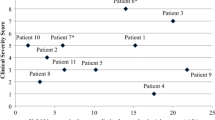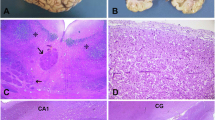Abstract
Pyridoxine-dependent epilepsy (PDE) is a recessive genetic disease characterized by epileptic encephalopathy with therapeutic response to pharmacological doses of pyridoxine and resistance to anti-epileptic treatments. The recent discovery in 2006 of the genetic defect antiquitin (ALDH7A1, OMIM #266100) has helped to understand the underlying mechanism, which is the accumulation of neurotoxic intermediates in the lysine catabolic pathway. The goal of the new therapeutic approach, termed triple therapy (TT) (pyridoxine, lysine-restricted diet and arginine supplementation), is to improve epilepsy control and neurocognitive development in patients with PDE. We present the 3-year treatment outcome for a child with PDE on pyridoxine treatment (started at age 5 months), lysine-restricted diet (started at age 17 months) and arginine supplementation therapy (started at age 19 months). The TT was well-tolerated with good compliance. No adverse events were reported. We observed a neurodevelopmental improvement, significantly fewer seizures, and a reduction of pipecolic acid (PA) as a biomarker of the illness. Our results show an improving clinical evolution, supporting and extending previous studies reporting efficacy of TT.



Similar content being viewed by others
References
Al Teneiji A, Bruun TUJ, Cordeiro D et al (2017) Phenotype, biochemical features, genotype and treatment outcome of pyridoxine-dependent epilepsy. Metab Brain Dis 32:443–451
Basura GJ, Hagland SP, Wiltse AM et al (2009) Clinical features and the management of pyridoxine-dependent and pyridoxine-responsive seizures: review of 63 North American cases submitted to a patient registry. Eur J Pediatr 168:697–704
Bennett CL, Chen Y, Hahn S, Glass IA, Gospe SM Jr (2009) Prevalence of ALDH7A1 mutations in 18 North American pyridoxine-dependent seizure (PDS) patients. Epilepsia 50:1167–1175
Bok LA, Halbertsma FJ, Houterma S et al (2012) Long-term outcome in pyridoxine-dependent epilepsy. Dev Med Child Neurol 54:849–854
Baxter P, Griffiths P, Kelly T, Gardner-Medwin D et al (1996) Pyridoxine-dependent seizures: demographic, clinical, MRI and psychometric features, and effect of dose on intelligence quotient. Dev Med Child Neurol 38(11):998–1006
Coughlin CR, van Karnebeek CDM, Al-Hertani W et al (2015) Triple therapy with pyridoxine, arginine supplementation and dietary lysine restriction in pyridoxine-dependent epilepsy: neurodevelopmental outcome. Mol Genet Metab 116:35–43
Falsaperla R, Vari MS, Toldo I et al (2018) Pyridoxine-dependent epilepsies: an observational study on clinical, diagnostic, therapeutic and prognostic features in a pediatric cohort. Metab Brain Dis 33:261–269
Gospe SM (2018) Developmental outcome in pyridoxine-dependent epilepsy: better late (onset) than early. Eur J Paediatr Neurol 22:575–576
Hunt AD, Stokes J, McCrory WW, Stroud HH et al (1954) Pyridoxine dependency: report of a case of intractable convulsions in an infant controlled by pyridoxine. Pediatrics 13:140–145
Kölker S, Boy SPN, Hernger J et al (2012) Complementary dietary treatment using lysine free, arginine fortified amino acid supplements in glutaric aciduria type 1: a decade of experience. Mol Genet Metab 107:72–80
Mills PB, Struys E, Jakobs C et al (2006) Mutations in antiquitin in individuals with pyridoxine dependent seizures. Nat Med 12:307–309
Mills PB, Footitt EJ, Mills KA et al (2010) Genotypic and phenotypic spectrum of pyridoxine-dependent epilepsy (ALDH7A1 deficiency). Brain 133:2148–2159
Mercimek-Mahmutoglu S, Corderio D, Cruz V et al (2014) Novel therapy for pyridoxine dependent epilepsy due to ALDH7A1 genetic defect: L-arginine supplementation alternative to lysine restricted diet. Eur J Paediatr Neurol 18:741–746
Mahajnah M, Corderio D, Austin V et al (2016) A prospective case study of the safety and efficacy of lysine restricted diet and arginine supplementation therapy in a patient with pyridoxine-dependent epilepsy caused by mutations in ALDH7A1. Pediatr Neurol 60:60–65
Pena IA, Mackenzie A, van Karnebeek CD (2017) Current knowledge for pyridoxine-dependent epilepsy: a 2016 update. Expert Rev Endocrinol Metab 12:5–20
De Rooy RLP, Halbertsma FJ, Struijs EA et al (2018) Pyridoxine dependent epilepsy: is late onset a predictor for favorable outcome? Eur J Paediatr Neurol 22:662–666
Scharer G, Brocker C, Vasiliou V et al (2010) The genotypic and phenotypic spectrum of pyridoxine-dependent epilepsy due to mutations in ALDH7A1. J Inherited Metab Dis 33:571–581
Schmidt Z, Murthy G, Ennis M et al (2020) Impact of enteral arginine supplementation on lysine metabolism in humans: a proof-of-concept for lysine-related inborn errors of metabolism. J Inherited Metab Dis. https://doi.org/10.1002/jimd.12233
Van Karnebeek CD, Hartmann H, Jaggumantri S et al (2012) Lysine restricted diet for pyridoxine-dependent epilepsy: first evidence and future trials. Mol Genet Metab 107:335–344
Van Karnebeek CD, Stockler-Ipsiroglu S, Jaggumatri S et al (2014) Lysine restricted diet as adjunct therapy for pyridoxine-dependent epilepsy: the PDE Consortium Consensus Recommendations. JIMD Rep 15:1–11
Van Karnebeek CD, Jaggumantri S (2015) Current treatment and management of pyridoxine-dependent epilepsy. Curr Treat Options Neurol 17:335
Van Karnebeek CD, Tiebout S, Niermeijer J et al (2016) Pyridoxine-dependent epilepsy: an expanding clinical spectrum. Pediatr Neurol 59:6–12
Van Vliet D, Derks TGJ, van Rijn M et al (2014) Single amino acid supplementation in aminoacidopathies: a systematic review. Orphanet J Rare Dis 9:7
Yuzyuk T, Thomas A, Viau K et al (2016) Effect of dietary lysine restriction and arginine supplementation in two patients with pyridoxine dependent epilepsy. Mol Genet Metab 118:167–172
Author information
Authors and Affiliations
Corresponding author
Ethics declarations
Conflict of interest
C Sarret has been a member of a scientific board for Biogen Laboratories. The other authors declare they have no conflict of interest.
Additional information
Publisher's Note
Springer Nature remains neutral with regard to jurisdictional claims in published maps and institutional affiliations.
Rights and permissions
About this article
Cite this article
Minet, P., Sarret, C., Miret, A. et al. Clinical and biochemical outcome of a patient with pyridoxine-dependent epilepsy treated by triple therapy (pyridoxine supplementation, lysine-restricted diet, and arginine supplementation). Acta Neurol Belg 121, 1669–1675 (2021). https://doi.org/10.1007/s13760-020-01467-3
Received:
Accepted:
Published:
Issue Date:
DOI: https://doi.org/10.1007/s13760-020-01467-3




